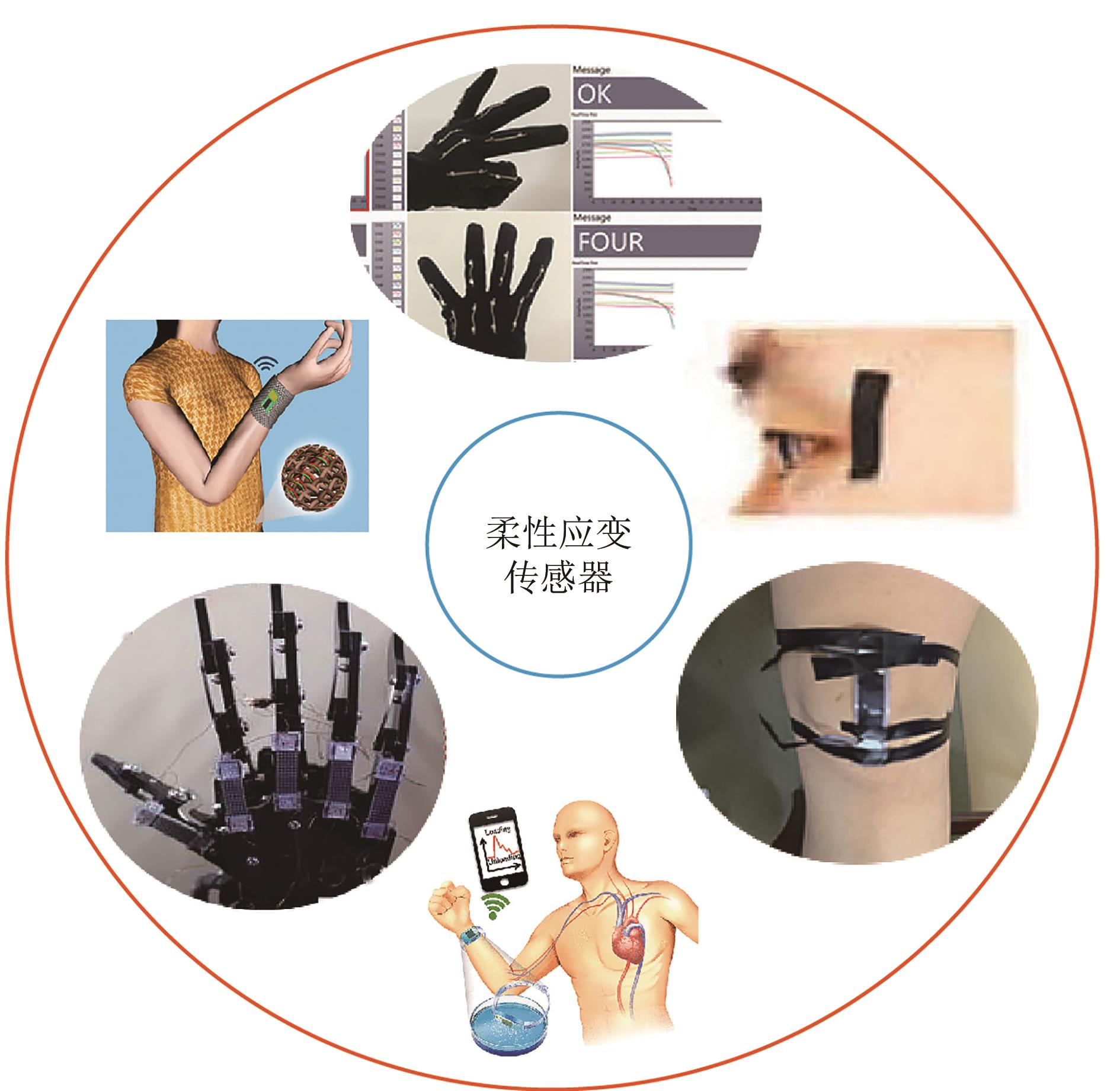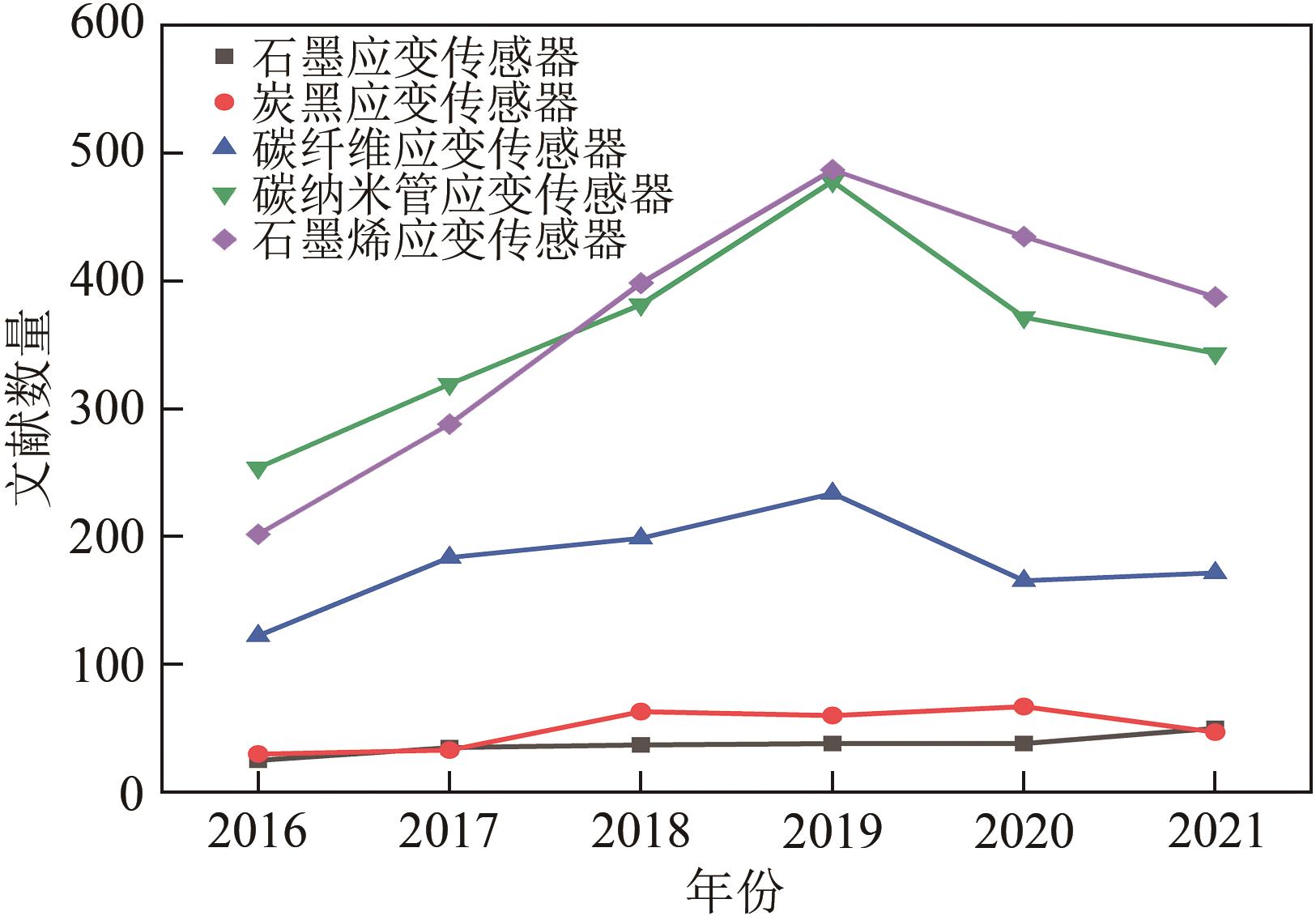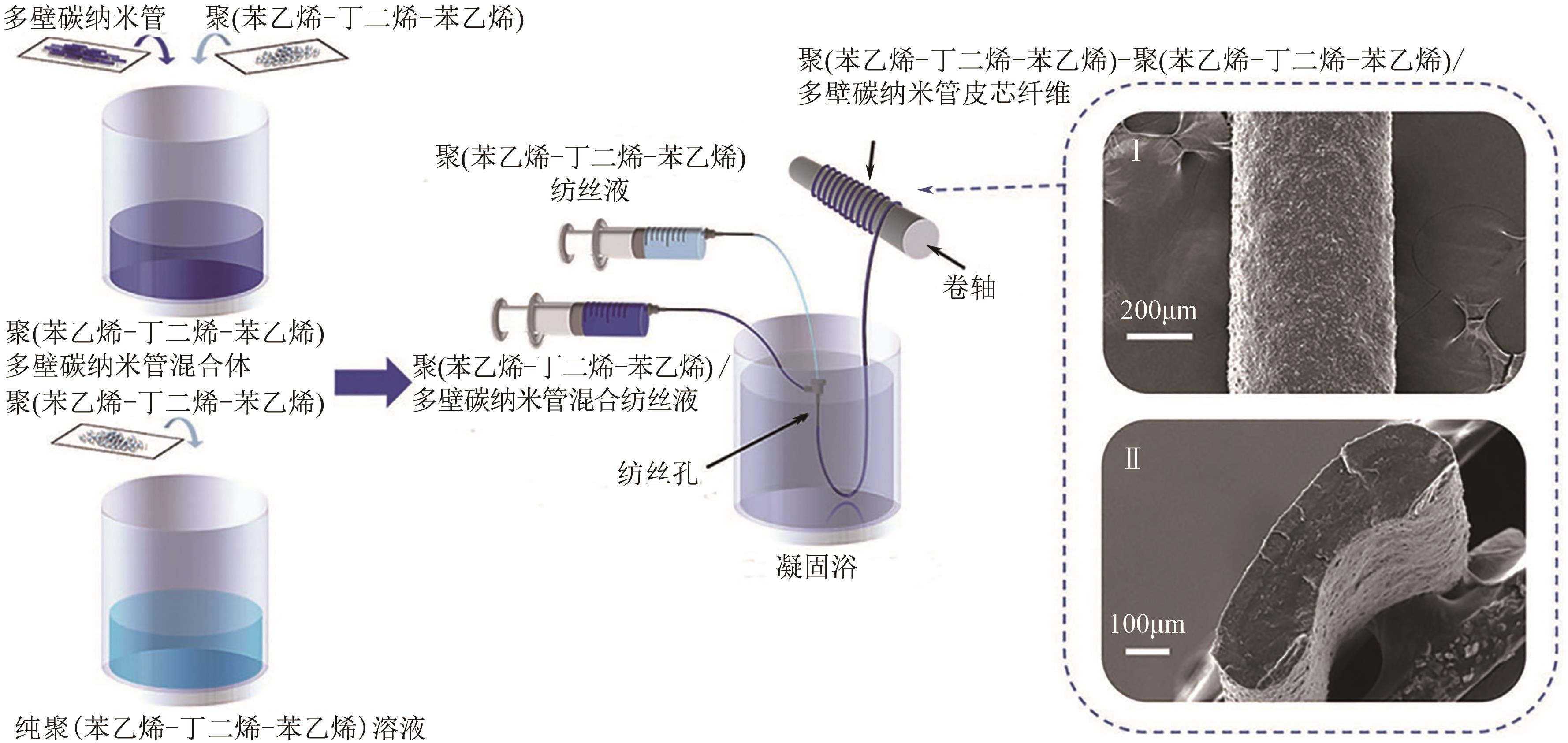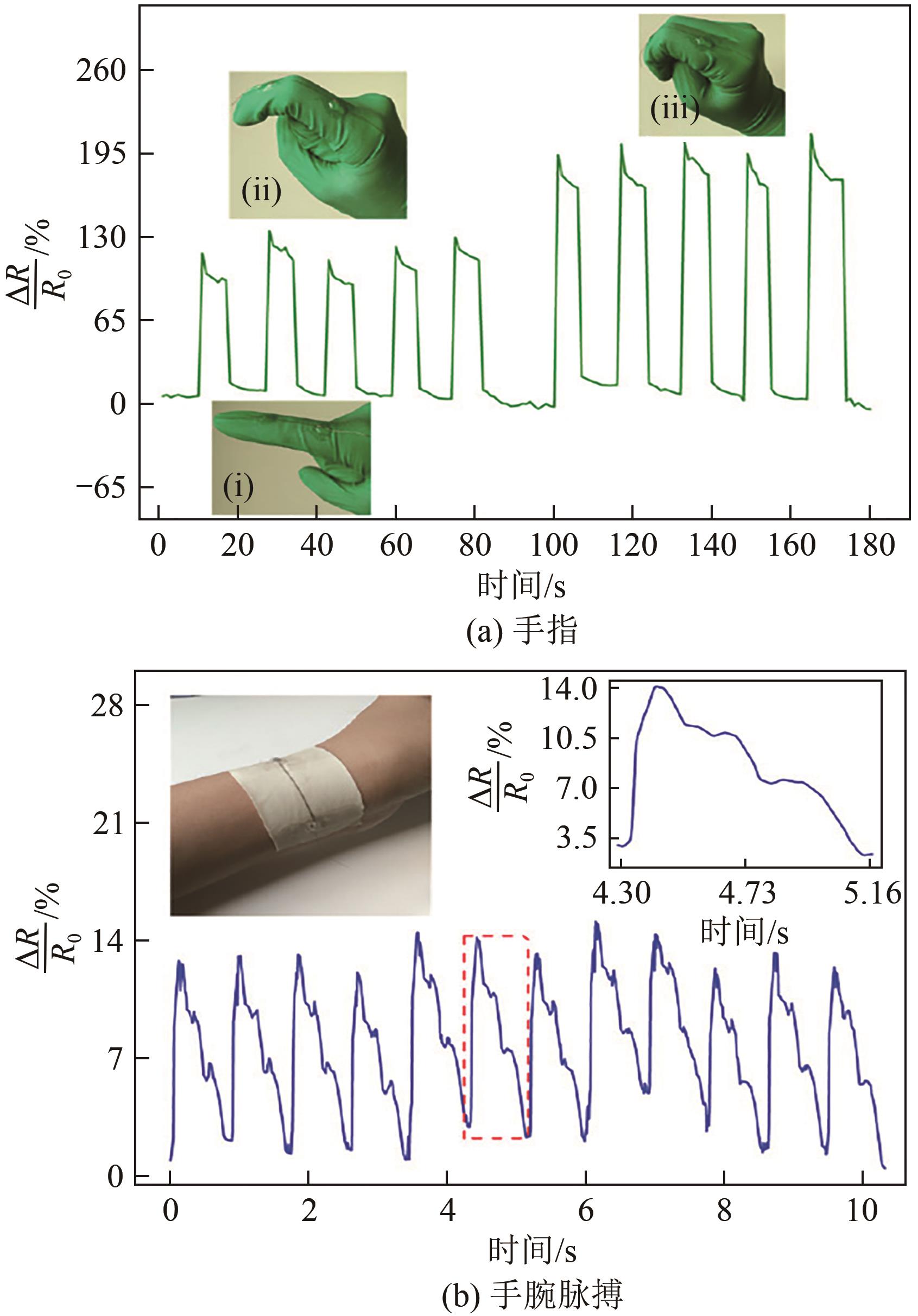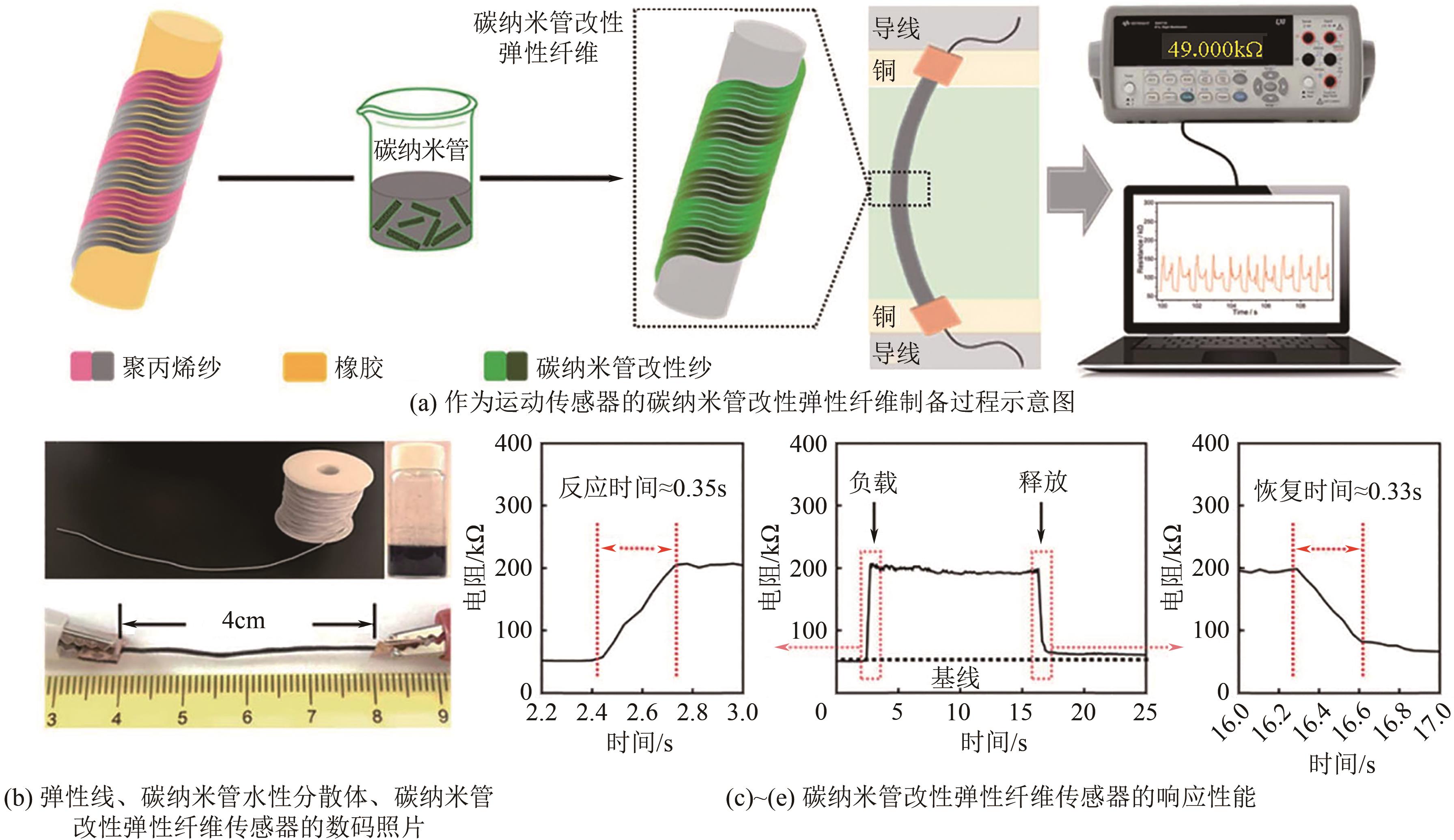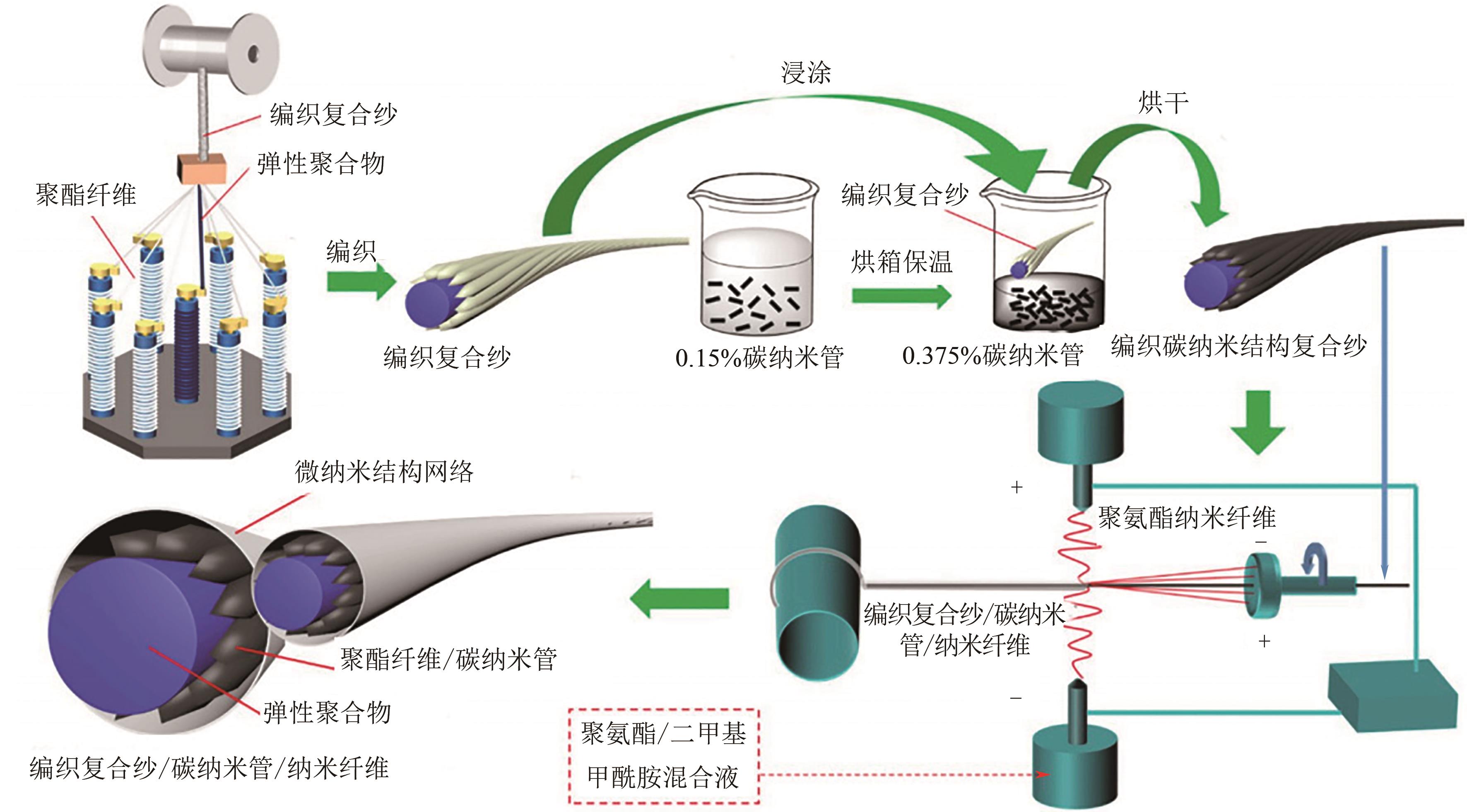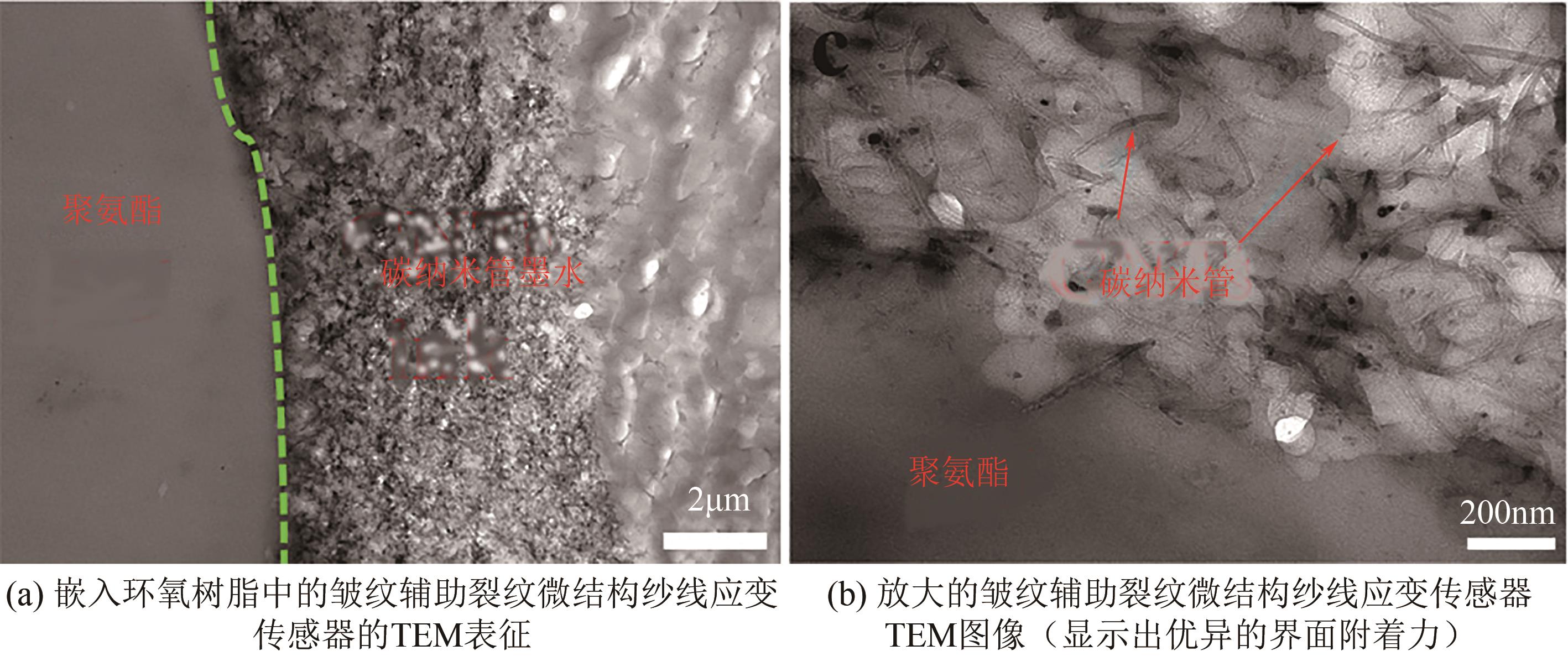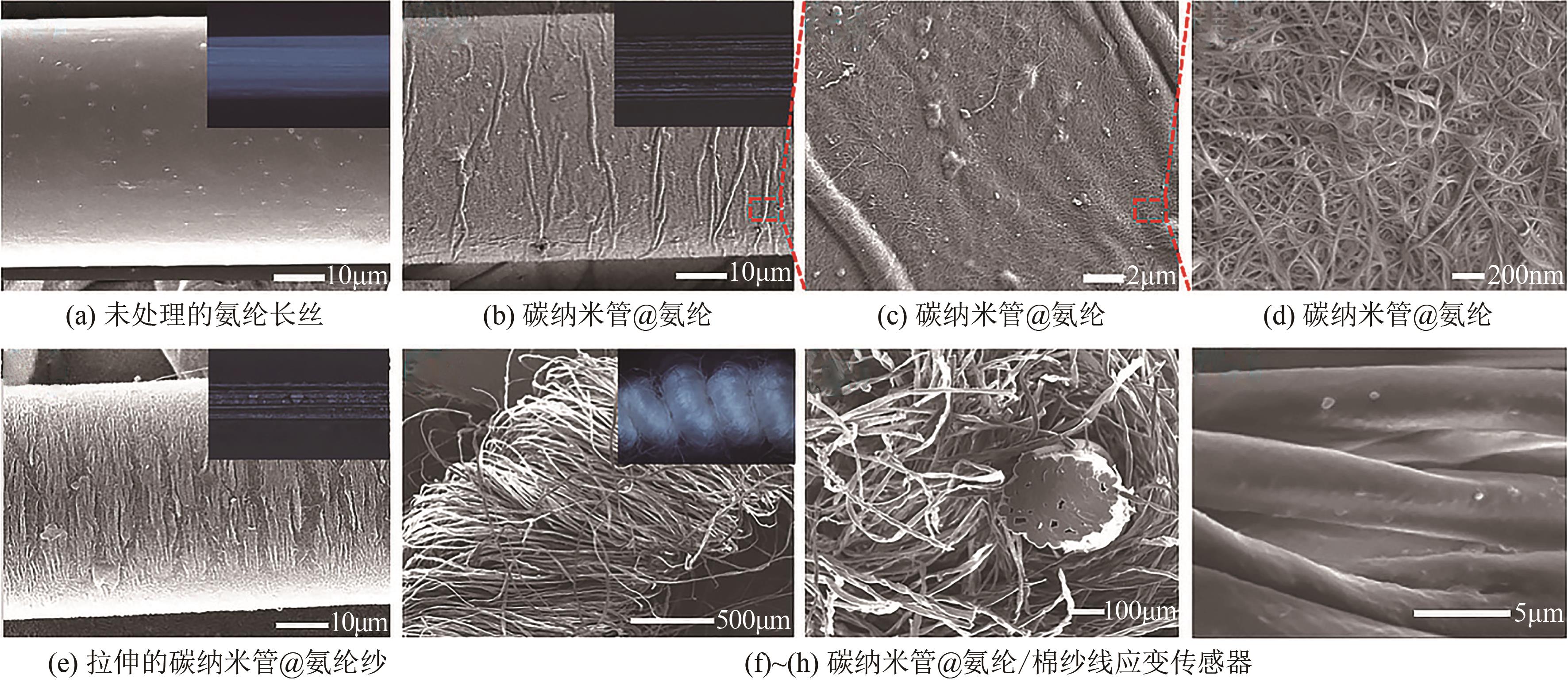Chemical Industry and Engineering Progress ›› 2023, Vol. 42 ›› Issue (2): 872-883.DOI: 10.16085/j.issn.1000-6613.2022-0766
• Materials science and technology • Previous Articles Next Articles
Application of carbon nanomaterials in PU yarn-based flexible strain sensors
HU Jinjian( ), LI Long(
), LI Long( ), DONG Zijing
), DONG Zijing
- School of Textile Science and Engineering, Xi’an Polytechnic University, Xi’an 710048, Shaanxi, China
-
Received:2022-04-27Revised:2022-07-05Online:2023-03-13Published:2023-02-25 -
Contact:LI Long
碳纳米材料在PU纱线基柔性应变传感器中的应用
- 西安工程大学纺织科学与工程学院,陕西 西安 710048
-
通讯作者:李龙 -
作者简介:胡锦健(1996—),男,硕士研究生,研究方向为智能纺织品。E-mail: 3325332463@qq.com。 -
基金资助:陕西省教育厅科研计划(20JK0652)
CLC Number:
Cite this article
HU Jinjian, LI Long, DONG Zijing. Application of carbon nanomaterials in PU yarn-based flexible strain sensors[J]. Chemical Industry and Engineering Progress, 2023, 42(2): 872-883.
胡锦健, 李龙, 董子靖. 碳纳米材料在PU纱线基柔性应变传感器中的应用[J]. 化工进展, 2023, 42(2): 872-883.
share this article
Add to citation manager EndNote|Ris|BibTeX
URL: https://hgjz.cip.com.cn/EN/10.16085/j.issn.1000-6613.2022-0766
| 材料 | 尺寸/nm | 长度/nm | 密度/g·cm-3 | 电导率/S·cm-1 | 拉伸强度/GPa | 杨氏模量/GPa |
|---|---|---|---|---|---|---|
| 炭黑 | ||||||
| 碳纳米管 | 10~300 | — | 1.8~2.1 | 0.1~10 | — | — |
| 单壁碳纳米管 | 0.6~1.8 | 2~1000 | 1.3 | 1×103~1×104 | 50~500 | 1500 |
| 多壁碳纳米管 | 5~50 | 1~500 | 1.75 | 5×102~1×104 | 10~60 | 1000 |
| 石墨烯 | 0.34 | — | 1.06 | 1×104 | 130 | 1000 |
| 纳米碳纤维 | 50~200 | 5×104~1×105 | 2 | 1×104 | 2.92 | 240 |
| 材料 | 尺寸/nm | 长度/nm | 密度/g·cm-3 | 电导率/S·cm-1 | 拉伸强度/GPa | 杨氏模量/GPa |
|---|---|---|---|---|---|---|
| 炭黑 | ||||||
| 碳纳米管 | 10~300 | — | 1.8~2.1 | 0.1~10 | — | — |
| 单壁碳纳米管 | 0.6~1.8 | 2~1000 | 1.3 | 1×103~1×104 | 50~500 | 1500 |
| 多壁碳纳米管 | 5~50 | 1~500 | 1.75 | 5×102~1×104 | 10~60 | 1000 |
| 石墨烯 | 0.34 | — | 1.06 | 1×104 | 130 | 1000 |
| 纳米碳纤维 | 50~200 | 5×104~1×105 | 2 | 1×104 | 2.92 | 240 |
| 材料 | 导电性 | 灵敏度 | 应变范围 | 耐久性(应变) | 响应时间 | 线性 | 参考文献 |
|---|---|---|---|---|---|---|---|
| MWCNT/PC | — | 约16 | — | — | — | — | [ |
| PU/AgNPs/GNPs | 82874S/m | — | 约150% | — | — | — | [ |
| PU/PEDOT:PSS | 约9.4S/cm | 约350(100%) 约1500(200%) | 200% | 500次(200%) | — | — | [ |
| SBS-SBS/MWCNTs | 10-3~10-2 | 25832.77(41.5%) | 41.5% | 5000次(10%) | — | — | [ |
| CB/TPU@TPU纤维 | — | 28084 | >200% | >11000次(60%) | 200ms | 是 | [ |
| CNT/TPU | 1.02kΩ/cm | — | 200% | 1250次(140%) | — | 是 | [ |
| SWCNT/MWCNT、TPU | 13S/cm | 1.67(0~20%) 1.24(20%~100%) | 100% | 2000次(50%) | — | — | [ |
| 材料 | 导电性 | 灵敏度 | 应变范围 | 耐久性(应变) | 响应时间 | 线性 | 参考文献 |
|---|---|---|---|---|---|---|---|
| MWCNT/PC | — | 约16 | — | — | — | — | [ |
| PU/AgNPs/GNPs | 82874S/m | — | 约150% | — | — | — | [ |
| PU/PEDOT:PSS | 约9.4S/cm | 约350(100%) 约1500(200%) | 200% | 500次(200%) | — | — | [ |
| SBS-SBS/MWCNTs | 10-3~10-2 | 25832.77(41.5%) | 41.5% | 5000次(10%) | — | — | [ |
| CB/TPU@TPU纤维 | — | 28084 | >200% | >11000次(60%) | 200ms | 是 | [ |
| CNT/TPU | 1.02kΩ/cm | — | 200% | 1250次(140%) | — | 是 | [ |
| SWCNT/MWCNT、TPU | 13S/cm | 1.67(0~20%) 1.24(20%~100%) | 100% | 2000次(50%) | — | — | [ |
| 材料 | 导电性 | 灵敏度(应变) | 应变范围 | 耐久性(应变) | 响应时间 | 线性 | 参考文献 |
|---|---|---|---|---|---|---|---|
| PU纱、CB、天然橡胶 | 4.1MΩ/cm | 38.9(1%) | 0~1% | 10000次(1%) | — | — | [ |
| PU纱、PVA、GMs、 PDMS、AgNPs | 423.7mS/cm | 490.20(0~50%) | 0~50% | 2000次(50%) | — | 是 | [ |
PU纱 PDA、rGO | (30.3±1.4)kΩ/cm | 131.8(90%) | 90% | 30000次(50%) | — | 是 | [ |
PU纱 石墨烯/PVA | 0.68kΩ/cm | 86.86 | 0~50% | 100次(50%) | — | 是 | [ |
PU纱 SR、GnP | 10~102S/m | 13.2(40%) | 104.0% | — | — | — | [ |
PU纱 PDMS、GnP、Au | — | 661.59(50%) 668.33(50%~75%) | 0~75% | 10000次(50%) | 约10ms | 是 | [ |
PU纱 CNT、CB | — | 45.4(150%) | 15%~150% | >1300次(100%) | — | 是 | [ |
| PU纤维、CNT | — | 约900% | 100次(200%) | — | 是 | [ | |
| PDMS纤维MWCNTs、石墨烯片、聚苯胺 | 1.2kΩ/cm | — | 1%~100% | — | — | — | [ |
PU纱 GNPs、CB、SWCNTs | — | 2.14(100%) | 0.5%~350% | >2400次 (10%~25%) | 约65ms | 是 | [ |
PP纱、橡胶芯 CNT、PDMS | — | — | 0~100% | — | 0.35s | — | [ |
PET纱、PU纱 GO | — | 12.06(50%) | 0~50% | — | — | — | [ |
PU纱 SWNT | 480kΩ/mm | 0.65±0.04 | 300% | 300000次(40%) | — | [ | |
| PET/弹性复合纱CNT | 0.12kΩ/cm | 46.4(0%~15%) 353(15%~29%) 980(29%~44%) | 0~125% | 1000次(20%) | 200ms | — | [ |
| 材料 | 导电性 | 灵敏度(应变) | 应变范围 | 耐久性(应变) | 响应时间 | 线性 | 参考文献 |
|---|---|---|---|---|---|---|---|
| PU纱、CB、天然橡胶 | 4.1MΩ/cm | 38.9(1%) | 0~1% | 10000次(1%) | — | — | [ |
| PU纱、PVA、GMs、 PDMS、AgNPs | 423.7mS/cm | 490.20(0~50%) | 0~50% | 2000次(50%) | — | 是 | [ |
PU纱 PDA、rGO | (30.3±1.4)kΩ/cm | 131.8(90%) | 90% | 30000次(50%) | — | 是 | [ |
PU纱 石墨烯/PVA | 0.68kΩ/cm | 86.86 | 0~50% | 100次(50%) | — | 是 | [ |
PU纱 SR、GnP | 10~102S/m | 13.2(40%) | 104.0% | — | — | — | [ |
PU纱 PDMS、GnP、Au | — | 661.59(50%) 668.33(50%~75%) | 0~75% | 10000次(50%) | 约10ms | 是 | [ |
PU纱 CNT、CB | — | 45.4(150%) | 15%~150% | >1300次(100%) | — | 是 | [ |
| PU纤维、CNT | — | 约900% | 100次(200%) | — | 是 | [ | |
| PDMS纤维MWCNTs、石墨烯片、聚苯胺 | 1.2kΩ/cm | — | 1%~100% | — | — | — | [ |
PU纱 GNPs、CB、SWCNTs | — | 2.14(100%) | 0.5%~350% | >2400次 (10%~25%) | 约65ms | 是 | [ |
PP纱、橡胶芯 CNT、PDMS | — | — | 0~100% | — | 0.35s | — | [ |
PET纱、PU纱 GO | — | 12.06(50%) | 0~50% | — | — | — | [ |
PU纱 SWNT | 480kΩ/mm | 0.65±0.04 | 300% | 300000次(40%) | — | [ | |
| PET/弹性复合纱CNT | 0.12kΩ/cm | 46.4(0%~15%) 353(15%~29%) 980(29%~44%) | 0~125% | 1000次(20%) | 200ms | — | [ |
| 材料 | 导电性 | 灵敏度 | 应变范围 | 耐久性(应变) | 响应时间 | 线性 | 参考文献 |
|---|---|---|---|---|---|---|---|
| PU纱、MWCNT | — | 111.1(0~50%) 1344.1(150%~200%) | 0~200% | >10000次(0~30%) | 约80ms | — | [ |
| PET长丝纱、PU长丝纱GO | — | 1.46(<5%) | 0~100% | >10000次(0~100%) | 120ms | — | [ |
TPU CNT、RGO | 821.8S/m | 38.1(1%~200%) 317.4(200%~350%) 781.4(350%~450%) 1441.1(450%~550%) 2160.4(550%~620%) | 620% | 1000次(50%) | — | — | [ |
| PU纱、棉纱、CNT | — | 3.43(0~100%) 11.93(100%~235%) 21.85(235%~300%) | 0~300% | 150次(20%) | — | — | [ |
| 材料 | 导电性 | 灵敏度 | 应变范围 | 耐久性(应变) | 响应时间 | 线性 | 参考文献 |
|---|---|---|---|---|---|---|---|
| PU纱、MWCNT | — | 111.1(0~50%) 1344.1(150%~200%) | 0~200% | >10000次(0~30%) | 约80ms | — | [ |
| PET长丝纱、PU长丝纱GO | — | 1.46(<5%) | 0~100% | >10000次(0~100%) | 120ms | — | [ |
TPU CNT、RGO | 821.8S/m | 38.1(1%~200%) 317.4(200%~350%) 781.4(350%~450%) 1441.1(450%~550%) 2160.4(550%~620%) | 620% | 1000次(50%) | — | — | [ |
| PU纱、棉纱、CNT | — | 3.43(0~100%) 11.93(100%~235%) 21.85(235%~300%) | 0~300% | 150次(20%) | — | — | [ |
| 1 | SI Yuying, CHEN Sujie, LI Ming, et al. Flexible strain sensors for wearable hand gesture recognition: From devices to systems[J]. Advanced Intelligent Systems, 2022, 4(2): 2100046. |
| 2 | LIU Qingqing, ZHANG Yue, LI Ang, et al. Reduced graphene oxide-coated carbonized cotton fabric wearable strain sensors with ultralow detection limit[J]. Journal of Materials Science: Materials in Electronics, 2020, 31(20): 17233-17248. |
| 3 | Nan NAN, HE Jianxin, YOU Xiaolu, et al. A stretchable, highly sensitive, and multimodal mechanical fabric sensor based on electrospun conductive nanofiber yarn for wearable electronics[J]. Advanced Materials Technologies, 2019, 4(3): 1800338. |
| 4 | ZHONG Junwen, ZHANG Yan, ZHONG Qize, et al. Fiber-based generator for wearable electronics and mobile medication[J]. ACS Nano, 2014, 8(6): 6273-6280. |
| 5 | GUO Ying, ZHONG Mengjuan, FANG Zhiwei, et al. A wearable transient pressure sensor made with MXene nanosheets for sensitive broad-range human-machine interfacing[J]. Nano Letters, 2019, 19(2): 1143-1150. |
| 6 | SHIN Sanghun, Byeongjo KO, Hongyun SO. Structural effects of 3D printing resolution on the gauge factor of microcrack-based strain gauges for health care monitoring[J]. Microsystems & Nanoengineering, 2022, 8(1): 12. |
| 7 | ZHANG Ding, XU Suwen, ZHAO Xue, et al. Wireless monitoring of small strains in intelligent robots via a joule heating effect in stretchable graphene-polymer nanocomposites[J]. Advanced Functional Materials, 2020, 30(13): 1910809. |
| 8 | CHEN Shuai, LOU Zheng, CHEN Di, et al. Wearable electronics: Polymer-enhanced highly stretchable conductive fiber strain sensor used for electronic data gloves[J]. Advanced Materials Technologies, 2016, 1(7):1600136. |
| 9 | PANG Yaokun, XU Xianchen, CHEN Shoue, et al. Skin-inspired textile-based tactile sensors enable multifunctional sensing of wearables and soft robots[J]. Nano Energy, 2022, 96: 107137. |
| 10 | ZHAI Wei, ZHU Jingzhan, WANG Ziqi,et al. Stretchable, sensitive strain sensors with a wide workable range and low detection limit for wearable electronic skins[J]. ACS Applied Materials & Interfaces, 2022, 14(3): 4562-4570. |
| 11 | MA Chao, WANG Meng, UZABAKIRIHO Pierre Claver, et al. High sensitivity, broad working range, comfortable, and biofriendly wearable strain sensor for electronic skin[J]. Advanced Materials Technologies, 2022, 7(8): 2200106. |
| 12 | LI Wei, XU Fujun, LIU Wei, et al. Flexible strain sensor based on aerogel-spun carbon nanotube yarn with a core-sheath structure[J]. Composites Part A: Applied Science and Manufacturing, 2018, 108: 107-113. |
| 13 | MA Huan, GAO Yang, LIU Wei, et al. Light-weight strain sensor based on carbon nanotube/epoxy composite yarn[J]. Journal of Materials Science, 2021, 56(23): 13156-13164. |
| 14 | ABED Ahmed, SAMOUH Zineb, COCHRANE Cédric, et al. Piezo-resistive properties of bio-based sensor yarn made with sisal fibre[J]. Sensors (Basel, Switzerland), 2021, 21(12): 4083. |
| 15 | LI Qiao, WANG Yuchi, JIANG Shen, et al. Investigation into tensile hysteresis of polyurethane-containing textile substrates for coated strain sensors[J]. Materials & Design, 2020, 188: 108451. |
| 16 | JANG Siyeon, KIM Jisun, KIM Da Wan, et al. Carbon-based, ultraelastic, hierarchically coated fiber strain sensors with crack-controllable beads[J]. ACS Applied Materials & Interfaces, 2019, 11(16): 15079-15087. |
| 17 | HE Zuoli, ZHOU Gengheng, BYUN Joon-Hyung, et al. Highly stretchable multi-walled carbon nanotube/thermoplastic polyurethane composite fibers for ultrasensitive, wearable strain sensors[J]. Nanoscale, 2019, 11(13): 5884-5890. |
| 18 | MAITY Debasis, RAJAVEL Krishnamoorthy, RAJENDRA KUMAR Ramasamy Thangavelu. MWCNT enabled smart textiles based flexible and wearable sensor for human motion and humidity monitoring[J]. Cellulose, 2021, 28(4): 2505-2520. |
| 19 | WANG Xin, LI Jinfeng, SONG Haonan, et al. Highly stretchable and wearable strain sensor based on printable carbon nanotube layers/polydimethylsiloxane composites with adjustable sensitivity[J]. ACS Applied Materials & Interfaces, 2018, 10(8): 7371-7380. |
| 20 | HAN Wenpeng, WU Yijun, GONG He, et al. Reliable sensors based on graphene textile with negative resistance variation in three dimensions[J]. Nano Research, 2021, 14(8): 2810-2818. |
| 21 | Min Juey YEE, MUBARAK N M, ABDULLAH E C, et al. Carbon nanomaterials based films for strain sensing application—A review[J]. Nano-Structures & Nano-Objects, 2019, 18: 100312. |
| 22 | SPERANZA Giorgio. Carbon nanomaterials: Synthesis, functionalization and sensing applications[J]. Nanomaterials (Basel, Switzerland), 2021, 11(4): 967. |
| 23 | 王程成, 贺德龙, 崔溢. 结构-导电复合材料研究进展[J]. 材料工程, 2018, 46(9): 1-13. |
| WANG Chengcheng, HE Delong, CUI Yi. Research progress in electrically conductive structural composites[J]. Journal of Materials Engineering, 2018, 46(9): 1-13. | |
| 24 | 王梦柯, 邱志成, 于春晓. 聚酰胺6/碳纳米复合材料的研究进展[J]. 材料导报, 2020, 34(S2): 1555-1561. |
| WANG Mengke, QIU Zhicheng, YU Chunxiao. Research progress of polyamide 6/carbon nanocomposites[J]. Materials Reports, 2020, 34(S2): 1555-1561. | |
| 25 | 马珮珮, 李龙, 吴磊. 导电纱线的制备及其在智能可穿戴装置中的应用研究进展[J]. 材料工程, 2021, 49(10): 31-42. |
| MA Peipei, LI Long, WU Lei. Research progress in preparation of conductive yarn and its application in smart wearable devices[J]. Journal of Materials Engineering, 2021, 49(10): 31-42. | |
| 26 | 马丽芸. 基于皮芯结构复合纱的柔性传感器和纳米发电机的研究[D]. 上海: 东华大学, 2021. |
| MA Liyun. Research on flexible sensor and nanogenerator based on composite core-sheath yarn[D]. Shanghai: Donghua University, 2021. | |
| 27 | BAUTISTA-QUIJANO José Roberto, Petra PÖTSCHKE, Harald BRÜNIG, et al. Strain sensing, electrical and mechanical properties of polycarbonate/multiwall carbon nanotube monofilament fibers fabricated by melt spinning[J]. Polymer, 2016, 82: 181-189. |
| 28 | KIM Seung Woo, KWON Sung Nam, NA Seok In. Stretchable and electrically conductive polyurethane- silver/graphene composite fibers prepared by wet-spinning process[J]. Composites Part B: Engineering, 2019, 167: 573-581. |
| 29 | SEYEDIN Shayan, MORADI Sepehr, SINGH Charanpreet, et al. Continuous production of stretchable conductive multifilaments in kilometer scale enables facile knitting of wearable strain sensing textiles[J]. Applied Materials Today, 2018, 11: 255-263. |
| 30 | LI Wenyue, ZHOU Yanfen, WANG Yuhao, et al. Core-sheath fiber-based wearable strain sensor with high stretchability and sensitivity for detecting human motion[J]. Advanced Electronic Materials, 2021, 7(1): 2000865. |
| 31 | YUE Xiaoyan, JIA Yanyan, WANG Xiaozheng, et al. Highly stretchable and durable fiber-shaped strain sensor with porous core-sheath structure for human motion monitoring[J]. Composites Science and Technology, 2020, 189: 108038. |
| 32 | TANG Jian, WU Yuting, MA Shidong, et al. Flexible strain sensor based on CNT/TPU composite nanofiber yarn for smart sports bandage[J]. Composites Part B: Engineering, 2022, 232: 109605. |
| 33 | LI Yahong, ZHOU Bing, ZHENG Guoqiang, et al. Continuously prepared highly conductive and stretchable SWNT/MWNT synergistically composited electrospun thermoplastic polyurethane yarns for wearable sensing[J]. Journal of Materials Chemistry C, 2018, 6(9): 2258-2269. |
| 34 | 汤健, 闫涛, 潘志娟. 导电复合纤维基柔性应变传感器的研究进展[J]. 纺织学报, 2021, 42(5): 168-177. |
| TANG Jian, YAN Tao, PAN Zhijuan. Research progress of flexible strain sensors based on conductive composite fibers[J]. Journal of Textile Research, 2021, 42(5): 168-177. | |
| 35 | WU Xiaodong, HAN Yangyang, ZHANG Xinxing, et al. Highly sensitive, stretchable, and wash-durable strain sensor based on ultrathin conductive Layer@Polyurethane yarn for tiny motion monitoring[J]. ACS Applied Materials & Interfaces, 2016, 8(15): 9936-9945. |
| 36 | LI Xiaoting, HU Haibo, HUA Tao, et al. Wearable strain sensing textile based on one-dimensional stretchable and weavable yarn sensors[J]. Nano Research, 2018, 11(11): 5799-5811. |
| 37 | NIU Ben, HUA Tao, HU Haibo, et al. A highly durable textile-based sensor as a human-worn material interface for long-term multiple mechanical deformation sensing[J]. Journal of Materials Chemistry C, 2019, 7(46): 14651-14663. |
| 38 | LI Xiaoting, HUA Tao, XU Bingang. Electromechanical properties of a yarn strain sensor with graphene-sheath/polyurethane-core[J]. Carbon, 2017, 118: 686-698. |
| 39 | MONTAZERIAN Hossein, RASHIDI Armin, DALILI Arash, et al. Graphene-coated spandex sensors embedded into silicone sheath for composites health monitoring and wearable applications[J]. Small (Weinheim an Der Bergstrasse, Germany), 2019, 15(17): e1804991. |
| 40 | LI Xiaoting, Keng Huat KOH, FARHAN Musthafa, et al. An ultraflexible polyurethane yarn-based wearable strain sensor with a polydimethylsiloxane infiltrated multilayer sheath for smart textiles[J]. Nanoscale, 2020, 12(6): 4110-4118. |
| 41 | ZHANG Ruifeng, PAN Peng, DAI Qiuli, et al. Sensitive and wearable carbon nanotubes/carbon black strain sensors with wide linear ranges for human motion monitoring[J]. Journal of Materials Science: Materials in Electronics, 2018, 29(7): 5589-5596. |
| 42 | GAO Yuan, GUO Fengyun, CAO Peng, et al. Winding-locked carbon nanotubes/polymer nanofibers helical yarn for ultrastretchable conductor and strain sensor[J]. ACS Nano, 2020, 14(3): 3442-3450. |
| 43 | JIN Chengchao, LIU Daiming, LI Ming, et al. Application of highly stretchy PDMS-based sensing fibers for sensitive weavable strain sensors[J]. Journal of Materials Science: Materials in Electronics, 2020, 31(6): 4788-4796. |
| 44 | HUANG Ying, ZHAO Yunong, WANG Yang, et al. Highly stretchable strain sensor based on polyurethane substrate using hydrogen bond-assisted laminated structure for monitoring of tiny human motions[J]. Smart Materials and Structures, 2018, 27(3): 035013. |
| 45 | ZHAO Wei, XU Sheng. A facile structural strategy for a wearable strain sensor based on carbon nanotube modified helical yarns[J]. Nanoscale Advances, 2021, 4(1): 250-257. |
| 46 | BAI Mingxuan, ZHAI Yujiang, LIU Fu, et al. Stretchable graphene thin film enabled yarn sensors with tunable piezoresistivity for human motion monitoring[J]. Scientific Reports, 2019, 9(1): 18644. |
| 47 | WANG Zifeng, HUANG Yan, SUN Jinfeng, et al. Polyurethane/cotton/carbon nanotubes core-spun yarn as high reliability stretchable strain sensor for human motion detection[J]. ACS Applied Materials & Interfaces, 2016, 8(37): 24837-24843. |
| 48 | PAN Junjie, HAO Baowei, SONG Wenfang, et al. Highly sensitive and durable wearable strain sensors from a core-sheath nanocomposite yarn[J]. Composites Part B: Engineering, 2020, 183: 107683. |
| 49 | HUANG Jieyu, ZHAO Min, HAO Yi, et al. Flexible, stretchable, and multifunctional electrospun polyurethane mats with 0D-1D-2D ternary nanocomposite-based conductive networks[J]. Advanced Electronic Materials, 2021, 7(1): 2000840. |
| 50 | HUANG Ching Tang, TANG Chien Fa, LEE Mingchen, et al. Parametric design of yarn-based piezoresistive sensors for smart textiles[J]. Sensors and Actuators A: Physical, 2008, 148(1): 10-15. |
| 51 | ZHAO Li, HU Hong, SHEN Jianming, et al. The use of a polytrimethylene terephthalate/polyester bi-component filament for the development of seamless garments[J]. Textile Research Journal, 2013, 83(12): 1283-1296. |
| 52 | SUN Hongling, DAI Kun, ZHAI Wei, et al. A highly sensitive and stretchable yarn strain sensor for human motion tracking utilizing a wrinkle-assisted crack structure[J]. ACS Applied Materials & Interfaces, 2019, 11(39): 36052-36062. |
| 53 | WANG Lihong, TIAN Mingwei, QI Xiangjun, et al. Customizable textile sensors based on helical core-spun yarns for seamless smart garments[J]. Langmuir: the ACS Journal of Surfaces and Colloids, 2021, 37(10): 3122-3129. |
| 54 | XIE Xiaoxu, HUANG Hong, ZHU Jing, et al. A spirally layered carbon nanotube-graphene/polyurethane composite yarn for highly sensitive and stretchable strain sensor[J]. Composites Part A: Applied Science and Manufacturing, 2020, 135: 105932. |
| 55 | ZENG Zhen, HAO Baowei, LI Daiqi, et al. Large-scale production of weavable, dyeable and durable spandex/CNT/cotton core-sheath yarn for wearable strain sensors[J]. Composites Part A: Applied Science and Manufacturing, 2021, 149: 106520. |
| 56 | WEN Ming, GUAN Xinchun, LI Hui, et al. Temperature characteristics of thick-film resistors and its application as a strain sensor with low temperature-sensitivity[J]. Sensors and Actuators A: Physical, 2020, 301: 111779. |
| 57 | WU Jin, WU Zixuan, WEI Yaoming, et al. Ultrasensitive and stretchable temperature sensors based on thermally stable and self-healing organohydrogels[J]. ACS Applied Materials & Interfaces, 2020, 12(16): 19069-19079. |
| 58 | WU Yuting, YAN Tao, PAN Zhijuan. Wearable carbon-based resistive sensors for strain detection: A review[J]. IEEE Sensors Journal, 2021, 21(4): 4030-4043. |
| 59 | DINH Nghia Trong, KANOUN Olfa. Temperature-compensated force/pressure sensor based on multi-walled carbon nanotube epoxy composites[J]. Sensors, 2015, 15(5): 11133-11150. |
| [1] | SONG Weitao, SONG Huiping, FAN Zhenlian, FAN Biao, XUE Fangbin. Research progress of fly ash in anti-corrosion coatings [J]. Chemical Industry and Engineering Progress, 2023, 42(9): 4894-4904. |
| [2] | WANG Xin, WANG Bingbing, YANG Wei, XU Zhiming. Anti-scale and anti-corrosion properties of PDA/PTFE superhydrophobic coating on metal surface [J]. Chemical Industry and Engineering Progress, 2023, 42(8): 4315-4321. |
| [3] | LIU Zhanjian, FU Yuxin, REN Lina, ZHANG Xiguang, YUAN Zhongtao, YANG Nan, WANG Huaiyuan. New research progress of superhydrophobic coatings in the field of anti-corrosion and anti-scaling [J]. Chemical Industry and Engineering Progress, 2023, 42(6): 2999-3011. |
| [4] | HE Yang, LI Siying, LI Chuanqiang, YUAN Xiaoya, ZHENG Xuxu. Anticorrosion performance of thermal reduction graphene oxide /epoxy resin composite coating [J]. Chemical Industry and Engineering Progress, 2023, 42(4): 1983-1994. |
| [5] | GU Haiyang, WANG Dong, ZONG Yongzhong, FU Shaohai. Preparation and property of tanning sludge based biomass flame retardant coating protein for cotton fabric [J]. Chemical Industry and Engineering Progress, 2023, 42(2): 641-649. |
| [6] | XIN Hua, PENG Qi, LI Yangfan, ZHANG Yan, CHEN Yue, LI Xinqi. Preparation and self-repairing performance of microcapsules with fluoropolyurethane dimethacrylate as the core [J]. Chemical Industry and Engineering Progress, 2023, 42(10): 5406-5413. |
| [7] | GUAN Yongxin, ZHOU Qiang, CHEN Liyi, LI Hui, LIU Xiaonan. Research progress of organic silicon and organic fluorine low surface energy antifouling coatings [J]. Chemical Industry and Engineering Progress, 2023, 42(10): 5286-5298. |
| [8] | ZHANG Xiao, WANG Zhanyi, WU Zhiying, LIU Yuting, LIU Zilong, LIU Xinjia, ZHANG Sui’an. Coating modification technology of fracturing proppant [J]. Chemical Industry and Engineering Progress, 2023, 42(1): 386-400. |
| [9] | LIU Yang, ZHAO Heng, LI Qian, XIN Hu, LI Xingtao. Research progress of perfluoropolyether polymers and functional composites [J]. Chemical Industry and Engineering Progress, 2023, 42(1): 321-335. |
| [10] | LI Xiang, GE Wujie, MA Xianguo, PENG Gongchang. Research progress on countermeasures for microcrack-induced capacity degradation of Ni-rich cathode materials [J]. Chemical Industry and Engineering Progress, 2022, 41(8): 4277-4287. |
| [11] | ZHAN Xun, CHEN Jian, YANG Zhaozhe, WU Guomin, KONG Zhenwu, SHEN Kuizhong. Progress on superhydrophobic materials from nanocellulose [J]. Chemical Industry and Engineering Progress, 2022, 41(8): 4303-4313. |
| [12] | WANG Hui, LIU Xinyi, WANG Wei, WAN Tong, LI Zongjie, WANG Shaoyu, CHENG Bowen. Research and application of electrospun nanofibers with special morphology: a review [J]. Chemical Industry and Engineering Progress, 2022, 41(8): 4341-4356. |
| [13] | GUO Zhi’an, SUI Zhihui, LI Yaping, XU Yikun, SUN Fang, ZHAO Xin. Research progress on preparation technology of phase-change bidirectional temperature-regulating textile materials [J]. Chemical Industry and Engineering Progress, 2022, 41(7): 3648-3659. |
| [14] | ZHU Xuedan, YAO Yali, MA Lili, WANG Jiaxin, YANG Jie, PENG Lei, HE Jinmei, QU Mengnan. Progress in preparation and application of superhydrophobic materials based on polyvinyl chloride [J]. Chemical Industry and Engineering Progress, 2022, 41(7): 3676-3688. |
| [15] | HE Meiying, YUE Xuejie, ZHANG Tao, QIU Fengxian. Infrared radiation control principle and its material research progress in thermal management application [J]. Chemical Industry and Engineering Progress, 2022, 41(7): 3719-3730. |
| Viewed | ||||||
|
Full text |
|
|||||
|
Abstract |
|
|||||
